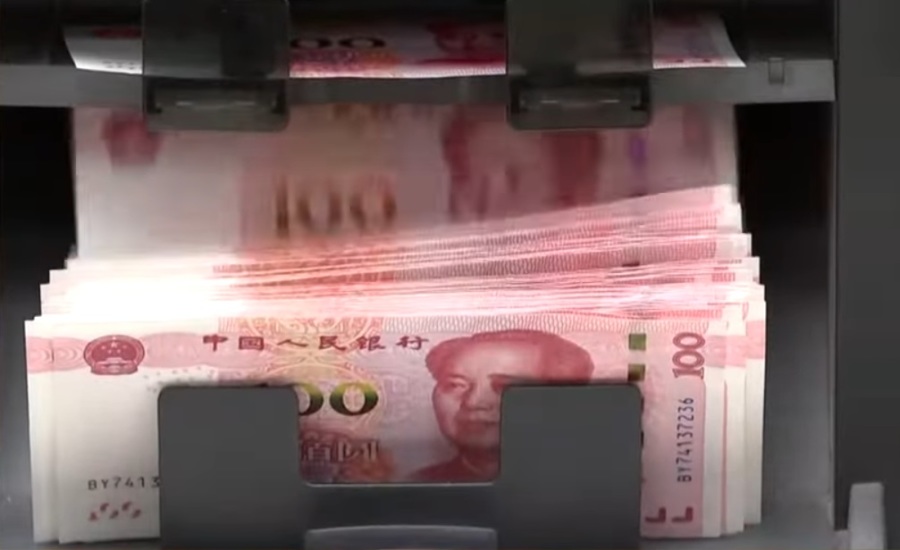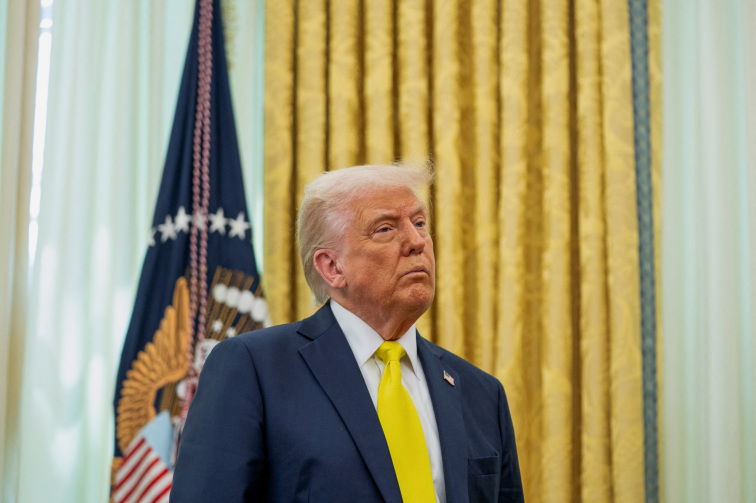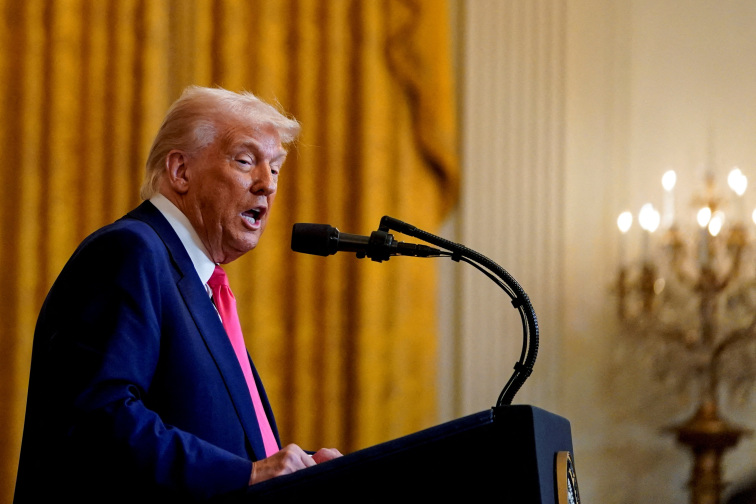Renminbi Banknotes (Video Screenshot)
[People News] On May 7, at a press conference held by the State Council of the Chinese Communist Party (CCP), Pan Gongsheng, Governor of the People's Bank of China (PBOC), announced three broad categories comprising ten specific measures. These included a 0.5 percentage point cut to the reserve requirement ratio (RRR), injecting roughly 1 trillion yuan in long-term liquidity into the market, a 0.1 percentage point reduction in policy interest rates, and a 0.25 percentage point reduction in individual housing provident fund loan rates.
The CCP’s state media responded with a chorus of praise, calling the central bank’s moves “beyond expectations, forceful, and utilising a wide range of tools.” They claimed the policies were a proactive implementation of the Central Politburo’s directives, a clear sign of a moderately loose monetary policy stance, and a powerful effort to stabilise employment, enterprises, the market, and public expectations.
The CCP has consistently claimed that China’s economy is stable and improving, steadily rebounding, and that overall conditions remain under control. They cite a manufacturing recovery and a Q1 GDP growth rate of 5.4%, which they tout as a “strong start” to the year.
But here’s the question: Why take such strong medicine if you're not sick? If your blood pressure is normal, why are you on antihypertensives? If your heart is healthy, why can’t you let go of emergency cardiac pills? If it’s not severe pneumonia, why are you repeatedly hooked up to a ventilator?
They admit to taking the medicine, but refuse to admit there's an illness. Confidence is built on deception, the economy is boosted through hype, consumption is stimulated with empty talk, and GDP growth curves are airbrushed with pretty charts. This mix of deception, confusion, and delusion no longer fools the market.
As of the May 7 close, the main A-share market indexes posted slight gains but overall opened high and closed low, with the good news already priced in. The STAR Market 100 Index fell 0.89%, while media, IT, and electronics sectors dropped by 0.56%, 0.42%, and 0.37%, respectively. A total of 1,811 individual stocks declined. Clearly, empty boasting is risky, and flooding the market must be done with caution.
On April 25, the CCP Politburo called for “accelerating the implementation of more active macroeconomic policies, fully utilising proactive fiscal policy and moderately loose monetary policy,” including “timely reserve requirement and interest rate cuts, maintaining ample liquidity, and intensifying support for the real economy.” When the Party speaks, the central bank follows. Just after a short holiday, they couldn’t wait to flood the market. Why such urgency?
Because they can’t hold on anymore! The U.S.-China trade war is heating up, and Trump's 145% tariffs hit hard — the pain is real. On April 29, the CCP Foreign Ministry’s video “We Will Not Kneel!” became the butt of jokes online. Was this a drunken servant daring to shout back at its master? After trading blows with a donkey, it was clear who got kicked.
Let’s look at some April economic data from China. The official manufacturing Purchasing Managers’ Index (PMI) was only 49%, below the 50% threshold that separates expansion from contraction. The Caixin manufacturing PMI came in at 50.4, down 0.8 points from March and the lowest in three months. The official non-manufacturing PMI also dropped from 50.8 in March to 50.4 in April.
In April, the new export orders sub-index from official data fell from 49.0 in March to 44.7. Caixin noted that China's new export orders fell into contraction territory, the lowest since August 2023.
On April 29, U.S. Treasury Secretary Janet Yellen warned that the ongoing tariff war could cost China 10 million jobs. Goldman Sachs estimated up to 16 million jobs at risk, especially in telecommunications equipment, apparel, and chemical production. Taiwan’s Institute for National Defence and Security Research estimated that the U.S.-China trade volume changes could lead to as many as 60 million unemployed in China.
How bad is the Chinese economy, really? On May 6, The Wall Street Journal published an article titled “How Bad Is China’s Economy? The Data Disappearing Might Tell Us,” pointing out that China has stopped releasing hundreds of statistical indicators that researchers and investors previously used. Cremation data and a business confidence index have been discontinued, and even soy sauce production data is gone.
The article emphasised that Chinese authorities have not explained the cessation of these data releases. But this trend comes just as the world’s second-largest economy is staggering under the burden of excessive debt, a crumbling real estate market, and other serious challenges, leading authorities to tighten control over the narrative.
Running a large country is like flipping pancakes. And in China, disappearing acts are a central feature of governance. “Being disappeared” is one of Xi Jinping’s ace tactics for ruling the country — a hallmark of the CCP’s mafia-like regime that upends basic human understanding. The best way to hide the true state of the economy is to suppress certain economic data, making them “disappear.”
Making economic data disappear is a core strategy in the CCP’s narrative of economic optimism. But with the U.S.-China tariff war at the gates, China’s economy has been stripped bare, the bright peak revealed to be a deep, dark abyss.
To kneel or not to kneel — that is the question. The answer has emerged: the CCP has chosen to kneel in secret.
On April 26, Bloomberg reported that Chinese authorities were considering lifting additional tariffs on items like semiconductors, medical devices, ethane, and other industrial chemicals. A list of 131 product categories reportedly under consideration for exemption was circulating among businesses and trade groups, including vaccines, chemicals, and jet engines.
But that wasn't enough. To further show goodwill to the U.S., the CCP made an even more submissive move — Xi Jinping sent his trusted aide Wang Xiaohong to privately engage with the U.S. to help address the fentanyl crisis.
But secret kneeling doesn’t count as kneeling. When it comes to saving the economy versus saving face, the CCP always prioritises saving face. With trade talks looming, the CCP must display confidence to its domestic audience. Thus, it rolls out reserve requirement cuts, rate reductions, and cheaper loans as economic stimulants — acting like a loyal servant refusing to kneel — to create bargaining chips and boost its position at the negotiating table.
Sadly, for all this scheming, it’s a fatal miscalculation. The Chinese economy is already terminally ill, suffering from structural chaos. Can flooding the market with money really bring it back to life? Data shows that from 2015 to now, the PBOC has cut the reserve requirement ratio 20 times in 10 years — an average of twice a year — with reductions ranging from 0.25 to 1 percentage point. In 2024 alone, interest rates have already been cut three times. Has the Chinese economy recovered?
As of 2024, China’s M2 money supply stands at 313.53 trillion yuan, a year-on-year increase of 7.3%, yet real GDP growth is only around 2% or less. Total RMB deposits are 302.25 trillion yuan, up 6.3% year-on-year. The public isn't unwilling to spend — they’re afraid to spend. In 2024, China saw a net outflow of $168 billion in foreign direct investment, the largest capital flight since records began in 1990. The RMB exchange rate is hovering near 7.3, and youth unemployment is realistically as high as 46.5%. The real estate market is in ruins — national real estate development investment fell by 10.6% year-on-year, and new home sales by value fell 17.1%. Prices for second-hand homes in 100 cities posted their largest decline in recent years.
If printing money and flooding the economy could truly stimulate growth, if painting rosy pictures guaranteed common prosperity, if sweet dreams could realise the Chinese Dream, then surely the Chinese people, who can endure hardship and even survive on grass, could also defeat the U.S. in a tariff war.
(First published by People News)








News magazine bootstrap themes!
I like this themes, fast loading and look profesional
Thank you Carlos!
You're welcome!
Please support me with give positive rating!
Yes Sure!